 The back end of "Bertha" as it tunnels under Seattle as part of an effort to replace the aging Alaskan Way Viaduct
The back end of "Bertha" as it tunnels under Seattle as part of an effort to replace the aging Alaskan Way Viaduct
Overview
The UW CEE Construction, Energy, and Sustainable Infrastructure (CESI) research area is a unique mixture of cutting-edge research and teaching. By focusing on research in energy and sustainable infrastructure, UW CESI researchers address pressing needs of society related to some of the biggest infrastructure challenges. These include the sustainability of buildings and roads, infrastructure system impacts from large-scale refugee movements, and how society and engineering come together in the developing world. These topics also feature prominently in the graduate and undergraduate curriculum. Featuring a tight-knit group of faculty, the CESI program is conducive to students working closely with one another and with renowned faculty on diverse projects.
Researchers collaborate with local and national organizations, including the Washington State Department of Transportation, the Transportation Improvement Board, the Greenroads Foundation, the National Cooperative Highway Research Program, the Federal Highway Administration, Puget Sound Energy, the National Science Foundation and Engineers Without Borders. Industry partners, many of which lead national and international construction firms, offer internships and careers that allow students and graduates to build the world's infrastructure and participate in the world's great projects.
Research topics
- Construction
Faculty involved: Joe Mahoney, Steve Muench, Dorothy Reed, Bethany Gordon - Energy
Faculty involved: Joe Mahoney, Dorothy Reed - Engineering and the developing world
Faculty involved: Bethany Gordon - Sustainable infrastructure
Faculty involved: Joe Mahoney, Steve Muench, Dorothy Reed, Bethany Gordon
Student research
Researcher: Miriam Hacker, Ph.D. student
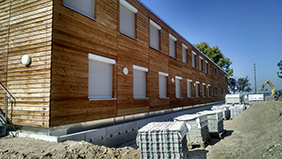
The displacement of people by war, natural disasters and other causes can lead to a rapid increase in population in receiving countries. While some countries create refugee camps outside of the city, other countries such as Germany and Sweden accommodate displaced persons within urban settings. The increase of people seeking asylum in these countries has increased significantly in the past five years, leading to a need for temporary accommodations while the government processes asylum applications. To better understand how this rapid population influx affects the built environment, UW CEE researchers in partnership with the University of Texas at Austin, are interviewing nonprofit organizations, private companies, utility companies and government agencies. A total of 56 interviews were conducted in four German cities and researchers are now conducting interviews in Swedish cities.
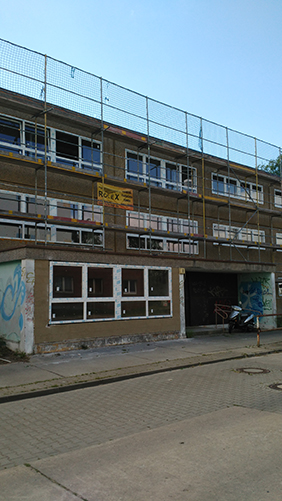
Researchers are investigating the following through the interviews:
- Provision of water services. Does the emergency accommodation of people in collective and decentralized housing facilities impact the function of water and wastewater utilities? How do utility employees perceive or justify their involvement in accommodating displaced persons?
- Regulations and building permitting processes. How are regulations and building permit processes upheld while arranging temporary facilities in renovated buildings like hotels, gymnasiums, office buildings and schools?
- Government coordination. Facilities for temporary accommodation in both Germany and Sweden reached capacity in 2015. How did various levels of government and external stakeholders coordinate the exploration of other temporary housing options?
Funding for the project is available through the National Science Foundation under Grant No. 1624417 and 1624409 and the Valle Scholarship and Scandinavian Exchange Program.
Researcher: Heta Kosonen, Ph.D. student
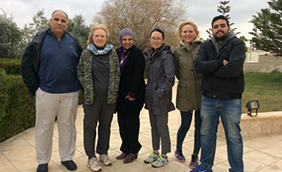
Wastewater treatment systems are critical components of urban and rural infrastructure. When designed and operated accordingly, they can help prevent the spread of fecal diseases and reduce human-induced environmental pollution. Experiences from the aftermath of several natural and humanitarian catastrophes, such as Hurricane Sandy and Hurricane Katrina, have demonstrated the potential for severe environmental impacts as displaced populations overwhelm wastewater treatment facilities in host communities.
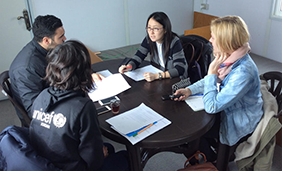
To better understand the technical decisions that trained professionals make when operating and setting up wastewater systems with both time and resource limitations, a CEE research team is investigating decision practices at advanced wastewater treatment plants in Jordan and Finland during the global refugee crisis. Using interdisciplinary methods and data sources, the researchers will develop a better understanding of the different intervening factors that impact operational decisions in order to ultimately improve the quality of wastewater treatment during crisis response.
The research team’s findings are based on wastewater quality data as well as expert interviews that were conducted at the Azraq refugee camp in Jordan and in several refugee centers in Southern Finland in 2016. The following research questions are explored:
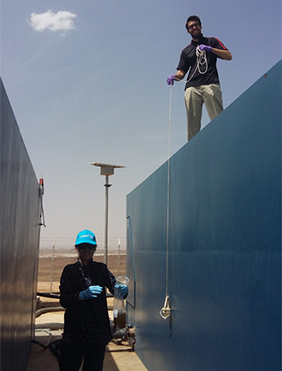
- How do non-technical factors, such as personal preferences and beliefs, influence wastewater treatment professionals’ technical judgments during emergency response operation?
- How does familiarity with steady-state decision processes prepare wastewater treatment professionals for emergency response operation?
The NSF RAPID funded Azraq refugee camp project, which began in Fall 2015, is a collaborative effort between UW, the Jordan University of Science and Technology (JUST) and UNICEF. The project PI is Dr. Heidi Gough and Co-PI Dr. Amy Kim. The Finland refugee centers project is a collaborative effort between UW and the Aalto University, Finland. The project is funded through a Finnish MVTT grant and an AWWA scholarship, and is led by Ph.D. student Heta Kosonen.
Researcher: Julian Yamaura, Ph.D. student
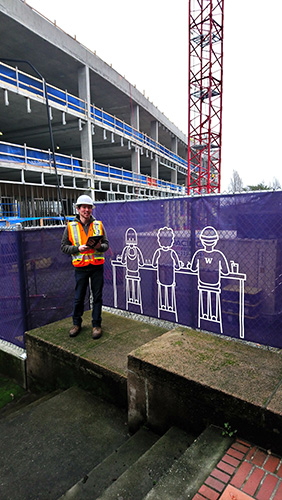
Rapid advancements in mobile devices continue to offer new capabilities. Ph.D. student Julian Yamaura is working to integrate a mobile technology solution, called HeadLight, for project inspections at transportation departments across the nation. Field measurements and interviews with pilot users at departments of transportation in three states indicate that HeadLight results in up to 25% increased productivity. HeadLight is developed by Pavia Systems, a software technology company originally started by UW faculty, staff and graduates through what is now known as UW CoMotion.
Researcher: Lysandra Medal, Ph.D. student
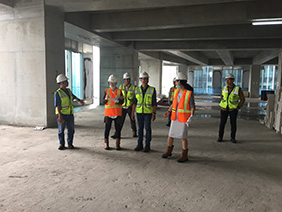
Prioritizing energy efficiency retrofits is increasingly important, as conserving energy benefits the environment and results in lower building operational costs. However, such investments are often not prioritized, which varies by country. To gain a better understanding of how stakeholders from different countries make such decisions, Ph.D. student Lysandra Medal together with assistant professor Amy Kim visited Indonesia in March 2017. The researchers conducted site visits and focus group discussions with various building stakeholders and will compare their findings to data gathered in the U.S.
Explore large infrastructure projects »
Learn about large-scale public works projects managed and led by construction engineers.
Labs
CEE faculty oversee labs and research groups, where they investigate a variety of critical problems related to transportation engineering. Undergraduate and graduate students are encouraged to participate in research.
Companies »
Research from the CESI area has led to the formation of two companies: HeadLight and Greenroads Foundation.
Degree programs
- Construction, Energy and Sustainable Infrastructure (CESI) Master’s Program
- Construction, Energy and Sustainable Infrastructure (CESI) Ph.D. Program
- Construction Engineering Online Master’s Program
- Energy Infrastructure Online Master’s Program